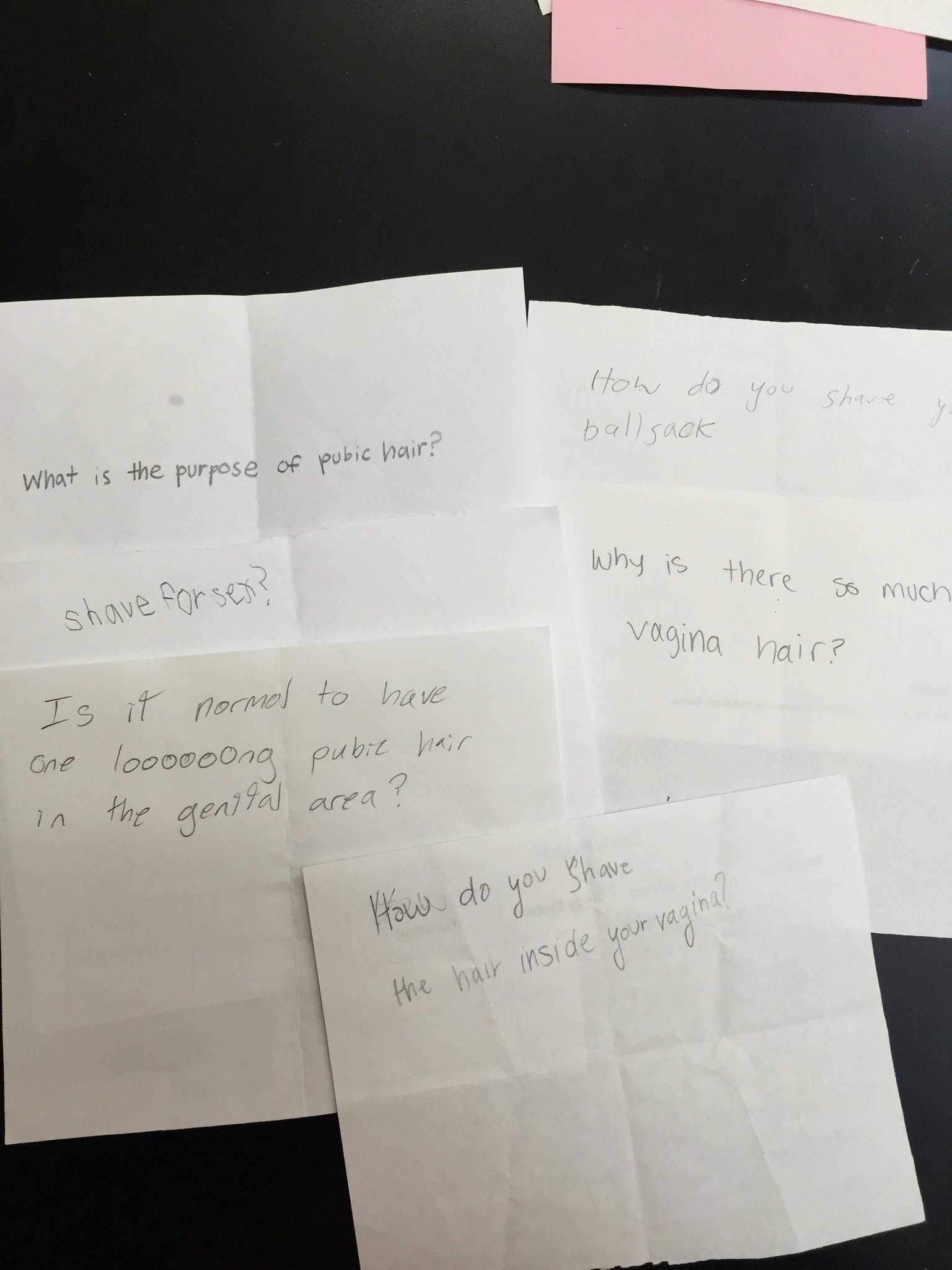Mic published a story on Monday showing photos of anonymous questions that one sex ed teacher has received from students in California and Virginia over the course of her professional career. The kids’ questions demonstrate their curiosity and thirst for knowledge. We decided to answer the most common questions because we figured adults probably could use some basic sex knowledge, too.
“What happens during an erection?”
The shaft of the penis is mostly made up of spongy tissue that fills with blood when a man becomes sexually aroused. Just like a dish sponge with water, the penis swells with blood when erect. But the inflow of the blood to the penis is mediated by the nervous system. Sexual arousal triggers the release of nitrous oxide, which opens the floodgates to the ol’ flesh balloon. In other words, if you’re feeling anxiety or nervousness, you may not perform as well because you can’t get your brain to open the valve.
So why does morning wood happen? AsapSCIENCE has that one covered:
(The short answer is that in the Rapid Eye Movement stage of sleep, your brain stops norepinephrine from keeping you soft, so you get hard instead.)
Erections go away after an orgasm because of hormones released by the orgasm—namely, oxytocin and prolactin. Those hormones in turn inhibit the ones that were turning you on in the first place, no longer allowing blood to flow back out of the penis and for it to return to a flaccid state. The vast majority of men go soft soon after ejaculation and can’t get erect again for a period of time called a “refractory period.” Some men (and women!) may also feel hypersensitive during the refractory period, and touching the genitals may be painful. They may also be disinterested in sex afterward.
So can you just stuff your flaccid penis into her vagina? You probably can, but it won’t feel good for either of you. Luckily there are plenty of ways for couples to enjoy sex with each other that don’t involve intercourse or erections (and yes, men can have an orgasm and ejaculate without being erect first.)
“Can hymen blood get into the penis?”
This was a tough one to answer directly through research. What I did find was that men can contract HIV from women if the virus enters the body through an opening on the penis (including the eye or a small cut.) So it follows that small amounts of fluids can enter that way as well. However, if both partners are STD-free then it should not pose a health risk and the man likely won’t notice it.
“Why do we have orgasm?”
An orgasm, generally defined, is the peak of sexual arousal and stimulation. For men. it typically comes with ejaculation and is very clearly defined, but for women it can be more difficult to achieve. It’s hard to say why women have a harder time reaching orgasm than men, though many have posited that it might have something to do with a lack of evolutionary “purpose” for the female orgasm. In short, though, when you have an orgasm you usually know it. Not all orgasms are Earth-shattering ascendances to nirvana, though. Men and women can have lackluster orgasms too.
Researchers look for road signs of orgasms in their studies, though most people would probably have a hard time monitoring for these benchmarks themselves. But during an orgasm people’s pain tolerance, heart rate, blood pressure, and pupil diameter all double.
“How do you squirt?”
The Daily Dot is no stranger to covering the myriad ways men and women can achieve orgasm. Women can orgasm from stimulating the nipples, the vagina (and G-spot), and most of all, the clitoris. The clitoris is hands down the most sensitive part of the female anatomy. But some men and women are even capable of having an orgasm from thinking about sex, or even spontaneously from exercise. So the best way to have an orgasm is to approach sexual sensation with an open mind and some patience.
One student asked what the “liquid excreted” from the vagina was during an orgasm. As we’ve written before, vaginal lubrication—the stuff that makes you wet—is a mix of water and proteins pushed out from the blood during sexual arousal. That doubling of blood pressure during an orgasm essentially forces that liquid out harder, so that can explain the increase of lubrication from the vagina during orgasm. But not every woman may notice an increase in lubrication from an orgasm, so don’t fret if it doesn’t happen to you.
Squirting is a somewhat different phenomenon that researchers are still not sure about. Researchers actually have two different terms for fluid excretion associated with the female orgasm: squirting and ejaculation.
Squirting is a large amount of liquid (enough to wet the bed) that appears to come from the urethra, which is located just north of the vaginal opening. Researchers are pretty sure that it’s urine—where else would that much fluid come from anyway? This may explain why some women feel the “sudden urge to pee” before orgasm.
And that’s OK! A little pee never hurt anyone. Just make sure you always pee after sex, ladies, lest you want a urinary tract infection.
“How come other animals have bones in the penis but not humans?”
Great question, anonymous child! Penis size and structure in animals is the result of all kinds of crazy processes of evolution. Some animals have bristles on the ends of their penises to scrape out semen from the female’s previous partners. (It’s more likely that their sperm will be the ones to make it to the egg that way.) Other animals have structures to keep the females from getting away until the deed is done.
Humans don’t have bones in their penises because they simply didn’t evolve to have them. Interestingly, though, human men have the largest penis size to body size of any of the other great apes. Researchers think this may simply be because the ladies liked the men with the larger penises, so they were the ones that got to mate with the females and pass along their big-penis genes. This is called “runaway selection.”
“How big is the normal man’s penis?”
Generally, women say that it’s not the size of the boat but the motion of the ocean that determines sexual satisfaction. In other words, size doesn’t matter, it’s what you do with it that counts.
But all things being equal, women reported in one survey that they were more likely to have a vaginal orgasm when having sex with a man whose penis was a little longer. Of course as we already said, the vaginal orgasm is not the end-all-be-all of sexual pleasure and most women find it easier to orgasm from clitoral stimulation, anyway.
Estimates on the average erect penis length also vary, but most find that it’s about 5.16 inches. An extremely small percentage of men are longer than 7 inches.
“Does losing your virginity hurt?”
Many women lose their hymens before they ever have sex, especially if they use tampons or participate in sports. (The hymen is a pretty flimsy piece of tissue, after all.) But some women may still have a little pain and bleeding their first time. The easiest way to avoid the pain part is lots and lots of foreplay—like, way, way more than you think you’ll need—and cultivating a relaxed atmosphere. Often, pain during sex happens due to a lack of lubrication and tense vaginal muscles as a result of anxiety. (Just like how those same things can cause a man to fail to rise to the occasion!)
In short, sex should never be painful. Persistent pain and/or bleeding from sex can often be a sign of a larger medical problem, so see your doctor if you have that issue.
“Why is there so much vagina hair?”
There is precisely nothing gross about pubic hair. But why does it exist? And why is there so much of it?
Pubic hair tends to show up as a part of puberty. Scientists aren’t totally sure why we have pubes but it seems to have something to do with the type of sweat glands around the genitals (and also the armpits.) But pubes can reduce friction during sex and walking, keep bacteria and other nasties out of your lady cave, and wick away sweat.
Pubic hairstyles, be they au naturel or full-on Brazillian, are 100 percent the choice of the owner of said pubic hairstyles. But ICYW, here’s sex educator Laci Green on how to get rid of your hair down there:
“How do you know what size condom to get?”
Lots of kids, hearteningly, asked about safe sex. But the importance of selecting the right condom size is essentially a myth. They’re stretchy, one-size-fits-almost anyone. Don’t believe me? Wait till the one-minute mark:
That said, if the normal-size condoms are distressingly uncomfortable, perhaps try the magnum sizes.
So then, should you buy for pleasure or safety? Both! Ultra-thin condoms are not any more likely to break than regular ones, says Planned Parenthood. But things like using petroleum-based lubricants, putting one condom on top of another, and holes in condoms will render them unsafe. Not putting on a condom properly can also reduce its effectiveness. Here’s how to put one on properly:
https://www.youtube.com/watch?v=psAHcNHzUUU
Oh and, when pulling out after sex, be sure to hold on to the end of the condom so it doesn’t roll off inside the vagina/anus.
But are condoms reliable? Yes, if used properly they should be pretty effective. According to the New York Times, over 10 years of use, 18 in 100 women will get pregnant as a result of condom failure (but that number skyrockets with actual condom use, so be sure you use it right). That should also tell you that things like plastic bags and candywrappers do not make for good substitutes.
Don’t like them odds? There are many options for birth control out there. Planned Parenthood has a comprehensive list of all available contraceptives full of facts and information about how they work and how to get them.
“How does anal sex work?”
Kids had a lot of questions about anal sex, which makes sense because it’s a penetrative sex act that cannot result in pregnancy. But that doesn’t make anal sex kid-friendly.
Unlike the vagina, the anus and rectum are generally built to be one-way streets. So in general, start small and work your way up if you’re going to go full hog. And as with any sex act, plenty of foreplay, ease of mind, and lubrication will go a long way toward pleasure.
But you should still use condoms. Tearing is more likely to occur during anal sex than vaginal sex, which will generally make anyone more predisposed to infections.
“How do gay people have sex?”
Finally, we break out of the heteronormativity. Many kids were curious about how people in homosexual relationships have sex—and it’s not that different from how straight couples have sex. Or at least, it doesn’t have to be.
Though gay couples can’t practice penis-in-vagina sex that doesn’t mean they don’t enjoy sex as much because, newsflash, there is no hierarchy of sexual pleasure. Basically, people in homosexual relationships will use their mouths, hands, genitals, or toys to achieve a pleasure during sex.
Now you know.
“What’s an Alaskan pipeline?”
Screengrab via www.audio-luci-store.it/Flickr (CC BY 3.0)









